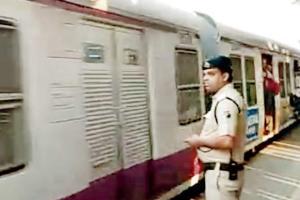Commuters won't fall from trains but will have to contend with high CO2 levels as closed entrances cut off ventilation.

A cop seen next to the coach with automatic door-closing mechanism
Suffocationtion and delay — this is what automatic door-closing in non-AC locals will result in as per the four-day trial held between Churchgate and Virar. Three coaches of a local were fitted with automatic closing-doors and trials were conducted between January 2 and 5 in an experimental move to curb commuters falling from trains.
ADVERTISEMENT
A report prepared by the railways observed that the closed doors delay the train by a few minutes and cause the carbon dioxide levels to rise due to lack of ventilation. It also noted that the coaches had less illumination.
The report also observed that passengers unaware of the system tried opening the door from outside as soon as the train would arrive at the station. This, the report suggested, can be avoided by removing door handles outside.
"Announcements were made and cops were present at the platforms with loudspeakers to alert commuters. But the crowd kept on increasing and became unmanageable," a senior official said.
The train had to stop at stations for almost a minute, which translates to 25 to 30 seconds more at every station.
"This could lead to an overall delay of a few minutes. The running time of a 12-car Churchgate-Borivli slow service is 65 minutes with halts at 20 stations. The doors would increase the running time by 500 to 600 seconds, that is eight to 10 minutes. The running time of a 12-car Churchgate-Virar fast service is 80 minutes with halts at 14 stations.
Here the running time will increase by 350 to 420 seconds, that is six to seven minutes.
During the trials, the train made it in time as it did not halt at Marine Lines, Charni Road and Grant Road stations in either direction, saving three minutes.
As per railways guidelines, the concentration of carbon dioxide inside the coach should be less than 700 ppm (parts per million) for ambient temperature. But during the trial, it was between 710 and 960. It could lead to passengers being suffocated.
"Train lights had to be switched on due to considerable reduction in brightness after door closure," the report observed.
"The trial was conducted during peak and non-peak hours. There was no problem with the door-closing mechanism. These are basic observations and a consolidated report will be sent to the railway board," Western Railway's chief public relations officer, Ravinder Bhakar, said.
Trial and error
On January 3 and 5, door-closing was obstructed by passengers boarding the train at Mira Road and Dahisar stations respectively. The mechanism had to be reset, leading to delays. On January 4, when the train was entering Dahisar station, the Emergency Buzzer of the door panel started ringing in the driving cab due to a snag, which was later fixed.

Catch up on all the latest Crime, National, International and Hatke news here. Also download the new mid-day Android and iOS apps to get latest updates
 Subscribe today by clicking the link and stay updated with the latest news!" Click here!
Subscribe today by clicking the link and stay updated with the latest news!" Click here!






